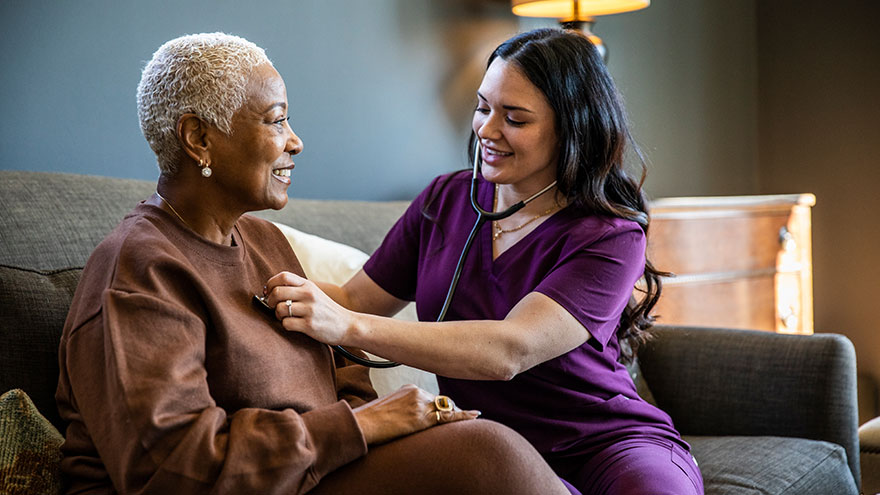Buscar
Results for ''s'
Clear-
5 Things to Know About Women’s Heart Disease
Heart disease is more common in women than many people think. In fact, it is the leading cause of death in the United States, ahead of cancer and stroke. However, the common signs and symptoms we often associate with men and heart disease don’t always align with women. Thankfully, Renown Health is home to the first women’s heart center in Nevada. The Helaine Greenberg Women’s Heart Center gives women in our community the opportunity to receive exemplary care and education. “At the Women’s Heart Center, we are proud to offer the women of our community the treatments, therapies and education they need to fight this silent killer,” Dr. Danish Atwal. 1. The warning signs for heart disease present differently in women than they do in men. Both men and women may experience chest pain during a heart attack, but the similarity of symptoms ends there. Heart disease is especially problematic for women because more than half of women who die of heart disease have no symptoms at all. Women tend to have subtler symptoms that mimic symptoms associated with common, mild illnesses: Fatigue or weakness Pain, pressure or tightness in the center of the chest Pain that spreads to the upper body, neck or jaw Sweating, nausea or vomiting Sudden dizziness Shortness of breath Trouble sleeping 2. Women are often not treated with the same medications as men, even when they should be. Women are less likely to receive heart medication because their disease is often misdiagnosed or because they do not seek proper care. According to a study done by Harvard Health Publishing in 2020, “A general lack of awareness of women’s heart disease may lead to doctors or patients missing heart attacks in women or delaying their diagnosis. For example, while the frequency of cardiovascular disease tends to be lower in women before menopause than in men, the frequency dramatically increases after menopause, when it accounts for approximately one out of every three deaths in women. 3. Women who have hypertension, high cholesterol, type 2 diabetes or gestational diabetes during pregnancy are at a higher risk of a heart attack in the future. Women who experienced complications related to developing high blood pressure or hypertension during pregnancy had a 63% increased risk for developing cardiovascular disease later in life, as stated by research funded by the National Heart, Lung, and Blood Institute. According to that same study, researchers found that early screenings and monitoring in four target areas – blood pressure, cholesterol levels, glucose levels and body mass index – could provide even more personalized targets to help delay or possibly prevent future cardiovascular events among women.
Read More About 5 Things to Know About Women’s Heart Disease
-
 Renown Institute For Heart & Vascular Health - South CarsonRenown Institute For Heart & Vascular Health - South CarsonHorarios
Renown Institute For Heart & Vascular Health - South CarsonRenown Institute For Heart & Vascular Health - South CarsonHorarios
Mié.8 a.m. - 4 p.m.Thu-TueCerrado -
Alzheimer's Safety Tips for Caregivers to Know
November is National Alzheimer’s Disease Awareness Month. At Renown Health, we know that Alzheimer's safety for your loved one is a priority, as the symptoms can sometimes lead to unsafe situations. We asked Dr. Jonathan Artz – a neurology physician with Renown Health and an assistant professor of clinical neurology at the University of Nevada, Reno School of Medicine – for tips on keeping loved ones safe and secure. According to the Alzheimer’s Association, Alzheimer’s disease affects safety in various ways, specifically due to body and brain adjustments. These changes can include: Judgment, including forgetfulness Sense of place – getting lost on the way home Behavior – being suspicious or fearful Body difficulty – losing balance Sensing ability – noticeable sensitivity in hearing, seeing or temperature Dr. Artz gives us four major tips to ensure your loved one’s safety as you both navigate this disease together. Watch for Wandering Those experiencing Alzheimer’s disease tend to wander and get lost. Try the following tips to reduce the risk of wandering: Get your loved one an ID bracelet and have them wear it at all times. You can also enroll your loved one in “Wandering Support.” Install door chimes so you know when exterior doors are open. Ask neighbors to call you if they see your loved one out alone. Go with your loved one when they insist on leaving the house. Don’t argue or yell. Instead, use distraction or gentle hints to get them to return home. Discourage Driving Driving can be unsafe for someone with this disease. With this in mind, ask a doctor whether it’s safe for your loved one to drive. For example, on a case-by-case basis, there are certain situations where doctors are required to report individuals with particular cognitive impairments, wherein a form of a driving assessment will be recommended. Limit access to the car. Keep the keys with you or lock them away. Ask an authority figure, such as an insurance agent or a doctor, to tell them not to drive. Adult-Proof Your Abode A simple living space is a safe living space. This means reducing clutter and removing any issues that may pose a safety concern. You may also want to get advice from an occupational therapist (home safety expert). Keep in mind that some changes may not be needed right away. Focus on major safety concerns first. Try the following tips: Add lighting (or glow-in-the-dark tape) to brighten dark areas, including stairways and halls. Use color contrast or texture indicators for dials, knobs and appliance controls. Remind your loved one not to carry items while walking to avoid a fall. Remove sharp objects from drawers and countertops. Avoid using small throw rugs or doormats, as they are easy to trip on. Move frequently used items so that they are easy to reach. Lock away alcohol and tobacco products, as they are not recommended for dementia patients. Install handrails in the shower, tub and near the toilet. Bathroom falls are especially common. Adjust the setting on your hot water heater so water does not scald. Those with Alzheimer’s can lose their sensitivity to temperature. Move and lock up hazardous chemicals and cleaning supplies, such as bleach and insecticides. Disable and remove guns or any weapons. Supervise any medication taken by your loved one. Promote a Positive & Healthy Lifestyle Continually emphasize the strengths of your loved one by promoting participation in meaningful activities, wellness visits and healthy habits to help them improve their well-being. Here are some ways to keep them physically and mentally active: Maintain regular vision and hearing screenings and make necessary adaptations. Establish a routine for daily activities. Encourage participation in self-care and leisure activities. Work with your loved one’s doctor to establish a healthy diet. Ensure proper hydration. It may help to set reminders for your loved one to drink fluids. Encourage regular exercise. Exercise delivers oxygen to the brain, improving brain health. Promote good sleep habits. Good quality sleep can increase overall brain health and has been associated with improving memory, attention and concentration. Resources and support are available with the Renown Memory Disorders Program. Providers within this program are specifically dedicated to treating several different memory-related disorders. Memory Disorders Resources & Support.
Read More About Alzheimer's Safety Tips for Caregivers to Know
-
Renown Health Nationally Recognized for Commitment to Providing High-Quality Stroke Care With Three American Heart Association Recognitions
The American Heart Association presents Get With The Guidelines®- Stroke Gold Plus awards for proven dedication to ensuring all stroke patients have access to best practices and life-saving care. Renown Health emergency, medical and surgical providers have received three American Heart Association’s Get With The Guidelines® awards. These awards demonstrate commitment to ensuring stroke patients receive the most appropriate treatments according to nationally recognized, research-based guidelines; reducing disabilities and increasing the number of lives saved. Every 40 seconds, someone in the U.S. has a stroke. Los derrames cerebrales son la quinta causa principal de muerte en los EE. UU. y la principal causa de discapacidades en adultos. Studies show patients recover better when providers consistently follow treatment guidelines. Get With The Guidelines puts the expertise of the American Heart Association and American Stroke Association to work for hospitals nationwide, helping ensure patient care is aligned with the latest research and evidence-based guidelines. “A stroke is an extremely serious condition that requires emergent medical treatment. The faster treatment is provided, the lower the risk of brain injury. We are proud of our thousands of physicians, nurses and clinicians who consistently practice exceptional patient care by adhering to the latest treatment guidelines,” said Brian Erling, MD, MBA, President and CEO, Renown Health. “Get With The Guidelines makes it easier for our teams to put proven knowledge and consistent protocols to work on a daily basis, which studies show can help people live longer and better lives.” “As a participant in Get With The Guidelines programs, Renown qualified for the awards by demonstrating that physicians and clinicians across our integrated health system are committed to improving quality care for stroke patients,” said Bill Plauth, MD, MMM, CPE, Chief Medical Officer for Renown Health and Associate Dean for Clinical Affairs at the University of Nevada, Reno School of Medicine. “If you or a loved one is experiencing a stroke, call 911, as you need skilled medical care immediately. Stroke care focuses on helping people recover as much function as possible and return to independent living. The Renown Neurovascular and Stroke Program and Renown Rehabilitation Hospital teams provide expert emergency stroke care and comprehensive neurovascular care and rehabilitation services.” “We are pleased to recognize Renown Health for its commitment to caring for those in their community who need cardiovascular care,” said John Warner, MD, FAHA, past president of the American Heart Association and CEO of The Ohio State University Wexner Medical Center. “Hospitals that follow the American Heart Association’s quality improvement protocols often see improved patient outcomes, fewer readmissions and lower mortality rates – a win for health care systems, families and communities.” “Renown Regional Medical Center is the only designated Comprehensive Stroke Center in northern Nevada,” says Benjamin Pence, DO, Director, Institute for Neurosciences at Renown. “This means that we have the highest level of certification to receive and treat the most complex stroke cases. Our Institute for Neurosciences team is led by the area's top neurologists, and we conduct research studies involving new ways of preventing, diagnosing, and managing neurological disorders. We care for patients suffering from nerve and brain disorders due to stroke, headache, epilepsy, and other acute causes. We also monitor and develop treatment options for patients with memory and movement disorders such as Alzheimer’s, Parkinson's Disease or Multiple Sclerosis.” Renown Health also received the American Heart Association’s Target: Stroke Honor Roll Elite award. To qualify for this recognition, hospitals must meet specific criteria that reduce the time between an eligible patient’s arrival at the hospital (within 60 minutes or less) and treatment for at least 85 percent of applicable patients. “It is an honor to be among the American Heart Association’s Stroke Honor Roll Elite award recipients,” said Bret Frey, MD, president of Northern Nevada Emergency Physicians Care teams at Renown Health. “We adhere to these rigorous guidelines daily and demonstrate our unwavering commitment to ensuring more people in northern Nevada receive leading emergency and trauma care and the gift of extended, healthier lives.” Renown Health also received the American Heart Association’s Target: Type 2 Diabetes Honor Roll - Stroke award. Target: Type 2 Diabetes aims to ensure patients with Type 2 diabetes, who might be at higher risk for complications, receive the most up-to-date, evidence-based care when hospitalized due to stroke. This award is given to hospitals that qualify for the silver level or higher achievement award within the Get With The Guidelines – Stroke program and achieve an overall Diabetes Cardiovascular Initiative Composite Score of more than 80 percent. About Renown Health Renown Health is Nevada’s largest, not-for-profit integrated healthcare network serving Nevada, Lake Tahoe, and northeast California. With a diverse workforce of more than 7,000 employees, Renown has fostered a longstanding culture of excellence, determination, and innovation. The organization comprises a trauma center, two acute care hospitals, a children’s hospital, a rehabilitation hospital, a medical group and urgent care network, and the locally owned not-for-profit insurance company, Hometown Health. To join the Renown team, visit renown.org/careers. About Get With The Guidelines Get With The Guidelines® is the American Heart Association/American Stroke Association’s hospital-based quality improvement program that provides hospitals with the latest research-based guidelines. Desarrollado con el objetivo de salvar vidas y acelerar la recuperación, Get With The Guidelines ha influido en la vida de más de 12 millones de pacientes desde 2001. For more information, visit heart.org.
-
Mantener su cerebro sano, sin importar su edad
It’s true there is no cure for dementia, yet studies suggest your life choices today can reduce brain decline in the future. How important is diet to brain health? Food is the foundation of your body. Fats, carbs and protein provide the energy for your cells and metabolism. So the quality and amount of food you eat directly affects your brain. Specifically, researchers are paying special attention to the link a high sugar diet and/ or an unhealthy fat diet may have on your brain. Your brain on sugar According to the Alzheimer’s Association, when too much sugar is in the bloodstream for long periods of time, it can damage the brain cells. Many people with diabetes may develop brain abnormalities, and these changes may increase chances of dementia — research is still being done to understand this connection. Many U.S. adults have prediabetes with blood sugar higher than normal. Insulin resistance often leads to diabetes. Insulin resistance has been linked to metabolic syndrome, which is a precursor for cardiovascular and cerebrovascular disease (heart attack, stroke). Some signs of metabolic syndrome include: Large waist size (40 inches or more for men, 35 inches and up for women) Low HDL (good) cholesterol level Higher than normal blood pressure — 130/85 and above Current research suggests too much sugar in the blood causes inflammation, which can damage brain cells. High carbohydrate foods, such as sweetened beverages, chips, white rice, white potatoes, bagels, cereals and desserts, have been shown to raise blood sugar. Although anyone can get diabetes, Hispanic Americans and African Americans are at greater risk.
Read More About Keeping Your Brain Healthy, No Matter Your Age
-
Women's Heart Center
Heart disease is the leading cause of death in women. According to the American Heart Association, heart disease kills more women than all forms of cancer combined and yet only 44% of women recognize that cardiovascular disease is their greatest health threat. Recognizing the urgent need for women's cardiac care, Renown Health established the Helaine Greenberg Women's Heart Center, the first of its kind in Nevada.
-
Las mujeres y los ataques cardíacos: signos sutiles que debe conocer
Heart disease is the number one killer of women – claiming one life every minute – yet many women don’t know that the signs of heart attack may not be the same symptoms they’ve learned about all their lives. In women, nearly 71% experienced unusual exhaustion in the weeks before, 50% had trouble sleeping and 42% suffered shortness of breath. Most importantly, about 43% had no chest pain. Women and Heart Attacks: The Subtle Symptoms In both men and women, the most common symptom is pressure or pain in the mid chest, but there are also more subtle signs. “Women can experience a heart attack without chest pain,” explains Letitia Anderson, M.D., cardiologist with Renown Institute for Heart & Vascular Health. “It is not uncommon for women to experience extreme fatigue, shortness of breath, dizziness, lightheadedness, nausea, vomiting and pain in the abdomen or back as their primary symptom.” Other symptoms can include: Neck or jaw pain Fullness or pressure that goes away and comes back The feeling of a rope being tied around your body and squeezed Some doctors have reported seeing patients who just didn’t "feel right." One woman simply felt more tired than usual while cleaning, while another woman reported feeling winded carrying boxes to the basement. Admittedly these are symptoms many of us would shrug or sleep off versus going to the hospital for immediate care, which is why it’s important to pay close attention to the warning signs. “Women are good at being the caregiver for the rest of the family and writing off their own symptoms as something minor, like indigestion or a muscle pull,” says Dr. Anderson. “Remember that heart attacks have early warning signs, and if they are recognized and treated in time, a heart attack can be prevented and heart damage avoided.” When You Need to Call 911 Paying attention to your body is key. If you’ve experienced any unusual or flu-like symptoms, struggled to breathe or just don’t feel right – give yourself a gut check and ask if you’ve honestly felt this way before. If you’re worried at all, you need to seek emergency care. Do not wait – call 911 immediately Take an ambulance to the hospital if at all possible Try to stay calm and take deep, slow breaths until medical help arrives.
Read More About Women and Heart Attacks: Subtle Signs to Know
-
Women and Stroke Surprising Signs to Know
Stroke is unfortunately common, with 1 in 5 American women experiencing it each year. When it comes to a stroke the phrase “time is brain” speaks to the urgency of getting rapid care. In fact, a woman may lose nearly 2 million neurons per minute of oxygen loss to the brain. The Renown Health Comprehensive Stroke Center experts share the importance of timely treatment and how stroke symptoms can differ in women. Women and Stroke – Surprising Symptoms Each year stroke affects more women than men. Even more concerning, women are less likely to recover from a stroke. The following non-traditional, less common, warning signs can be common in women: Hiccups with chest pain Sudden disorientation, drowsiness, confusion or a general altered mental status Nausea or vomiting A sudden headache that feels like the ‘worst headache of your life’ Unusual chest pain (especially with hiccups) Body numbness or weakness, such as an arm or leg suddenly ‘falling asleep’ Fainting or loss of consciousness Stroke Diagnosis The first step is neuroimaging by CT scan. This allows for rapid identification of any bleed, and also assists in determining candidacy for the early clot busting medication. MRI brain imaging is much higher resolution, and can better determine the core stroke size, assisting in prognosis and recovery. Since strokes have several different origins, an inpatient workup is essential to determine the underlying cause. Whether the stroke is secondary to plaque in the large vessels, clots being thrown in the setting of atrial fibrillation (an abnormal heart rhythm), or small vessel disease from years of uncontrolled vascular risk factors (high blood pressure, smoking, high cholesterol, diabetes), determining the cause is essential to implementing a management plan to reduce risk for further strokes. Quick Treatment for Stroke is Key Early recognition of stroke symptoms and seeking prompt attention is paramount. There are interventions that can be instituted to minimize the stroke and increase likelihood of recovery, but only if a patient presents to the hospital early. A clot busting medication, called tPA, can be given to patients with stroke if given within 4-5 hours from time of onset. Renown Regional Health Center is designated as a Comprehensive Stroke Center, the highest level of stroke certification available. To earn the designation of comprehensive stroke center, a hospital has to meet stringent requirements, including biannual on-site evaluations. This includes care for ischemic stroke patients (lack of blood flow), hemorrhagic stroke patients (bleeds), and determining the underlying cause to guide secondary stroke management prevention. Stroke Symptoms Remember “B.E.F.A.S.T.” to recognize the symptoms of a stroke below: B – Balance Being off balance or dizzy, is common. E – Eyes An eyesight change such as blurring or double vision may occur. F – Face droop One side of the face, or lip, droops A – Arm weakness Does one arm drift down? S – Speech Talking may slur or sound strange. T – Time Time to call 911. Call an ambulance immediately if you or anyone else, experiences any of these symptoms.
-
Renown Health Is Nationally Recognized for Its Commitment To Providing High-Quality Heart Failure Care With Three American Heart Failure Recognitions
Renown Health Cardiology has received the American Heart Association’s Get With The Guidelines® - Heart Failure Gold Plus quality achievement award for its commitment to improving outcomes for patients with heart failure, meaning reduced readmissions and more healthy days at home. The heart care team also received Target: Heart Failure Honor Roll and Target: Type 2 Diabetes Honor Roll. About 6 million U.S. adults are living with heart failure (HF), a number that is expected to increase to more than 8 million by 2030. Despite the name, HF doesn’t mean that the heart has stopped working – it means the heart is having a hard time pumping blood and oxygen throughout the body. While there’s no cure for HF, patients can live a quality life by working with their health care team to create and stick with a plan that may include medication, symptom monitoring and lifestyle changes. The Get With The Guidelines - Heart Failure quality achievement award is earned by hospitals that demonstrate a commitment to treating patients according to the most up-to-date guidelines as outlined by the American Heart Association. Get With The Guidelines puts the expertise of the American Heart Association to work for hospitals nationwide, helping ensure patient care is aligned with the latest research- and evidence-based guidelines. The program aims to increase healthy days at home and reduce hospital readmissions for heart failure patients. “Renown Health is committed to improving patient care by adhering to the latest treatment guidelines,” said Jayson Morgan, MD, Director of Cardiovascular Services at Renown Health. “Get With The Guidelines makes it easier for our teams to put proven knowledge and guidelines to work on a daily basis, which studies show can help patients recover better. The end goal is to ensure more people in northern Nevada can experience longer, healthier lives.” Each year, program participants qualify for the award recognition by demonstrating how their organization has committed to providing quality care for HF patients. In addition to following treatment guidelines, Get With The Guidelines participants also provide education to patients to help them manage their HF at home. “We are pleased to recognize the leaders and teams at Renown Health for a strong commitment to caring for people with heart failure,” said Clyde W. Yancy, MD, MSc, MACC, FAHA, MACP, FHFSA, national chairperson of the American Heart Association Heart Failure systems of care advisory group and chief, division of cardiology at Northwestern University, Feinberg School of Medicine. “Hospitals that participate in Get With The Guidelines quality improvement programs often see better patient outcomes, fewer readmissions and lower mortality rates – a win for health care systems, families and communities.” Renown Health is also recognized on the American Heart Association’s Target: Heart FailureSM Honor Roll. Hospitals on the Honor Roll meet specific criteria that improves medication adherence, provides early follow-up care and coordination and enhances patient education. The goal is to further reduce hospital readmissions and help patients improve their quality of life in managing this chronic condition. Renown Health additionally received the American Heart Association’s Target: Type 2 Diabetes Honor Roll™ award. Target: Type 2 Diabetes aims to ensure patients with Type 2 diabetes, who might be at higher risk for complications, receive the most up-to-date, evidence-based care when hospitalized due to heart disease or stroke. About Renown Health Renown Health is Nevada’s largest, not-for-profit integrated healthcare network serving Nevada, Lake Tahoe, and northeast California. With a diverse workforce of more than 7,000 employees, Renown has fostered a longstanding culture of excellence, determination, and innovation. The organization comprises a trauma center, two acute care hospitals, a children’s hospital, a rehabilitation hospital, a medical group and urgent care network, and the locally owned not-for-profit insurance company, Hometown Health. Renown is currently enrolling participants in a community-based genetic population health study, the Healthy Nevada Project®. Acerca de Get With The Guidelines Get With The Guidelines® es el programa de mejora de calidad hospitalaria de la Asociación Estadounidense del Corazón y la American Stroke Association que proporciona a los hospitales las últimas pautas basadas en la investigación. Desarrollado con el objetivo de salvar vidas y acelerar la recuperación, Get With The Guidelines ha influido en la vida de más de 12 millones de pacientes desde 2001. For more information, visit heart.org.
-
Atención cardíaca
We lead the region in cardiology care with our technological expertise and patient-centered approach. Our comprehensive team diagnoses heart disease and other cardiac conditions, offering personalized treatment plans. Plus, our specialty team provides you access to the most advanced medical, surgical and minimally invasive techniques.
-
 Renown Institute For Heart & Vascular Health - FallonRenown Institute For Heart & Vascular Health - FallonHorarios
Renown Institute For Heart & Vascular Health - FallonRenown Institute For Heart & Vascular Health - FallonHorarios
Mon-Tue8 a.m. - 4 p.m.Mié.CerradoThu-Fri8 a.m. - 4 p.m.Sáb. y dom.Cerrado -
Parkinson's Disease Know The Important Symptoms
Parkinson’s disease – you may have heard of it because Neil Diamond and Ozzy Osbourne were recently diagnosed with it. Or perhaps you know Michael J. Fox is a strong advocate and funds research through his foundation. Neurologist Jonathan Spivack, MD, discusses this disease, while physiatrist Stephanie Jones, DO, explains how physical therapy can help as a supplemental treatment. According to the Parkinson’s Foundation about ten million people worldwide currently have this disease. What is Parkinson’s Disease? “Parkinson’s disease is a neurodegenerative disease that progresses slowly and definitely, though at variable rates,” explains Dr. Spivack. “Symptoms go beyond the classic motor changes. It results from a loss of specific dopamine-producing brain cells. Specifically, this loss is likely due to a mix of genetic and environmental factors,” he adds. Dopamine allows communication between particular nerve cells responsible for movement. If you have Parkinson’s dopamine levels gradually drop, causing a loss of motor skills. Generally, most patients with the disease are over age 65. Early Signs and Symptoms Diagnosing Parkinson’s can be difficult as some of the symptoms happen during the natural aging process. The Parkinson’s Foundation identifies the following 10 early signs of PD: Tremors or shaking of your hand, fingers or chin Small handwriting Loss of smell Sudden movements during sleep Stiffness when walking or moving Constipation Softer or lower voice volume Mad facial expression Feeling dizzy or faint Hunching or stooping posture A single sign may not point to the disease, but if you (or a loved one) has multiple signs, talk to your healthcare provider.
Read More About Parkinson's Disease Know The Important Symptoms







